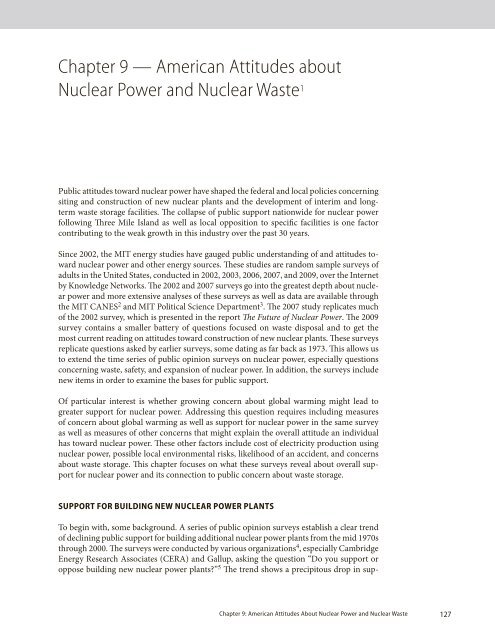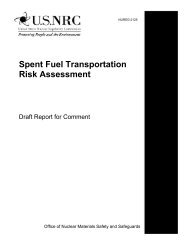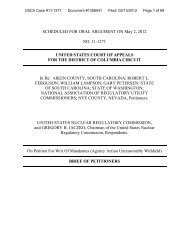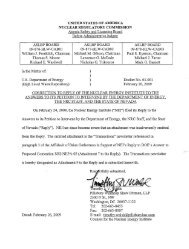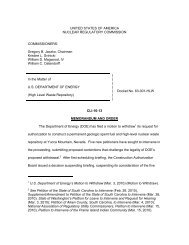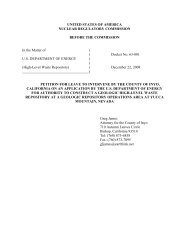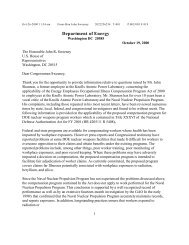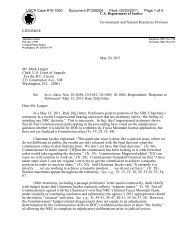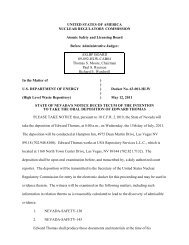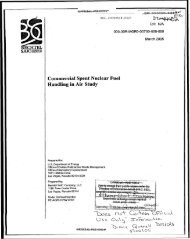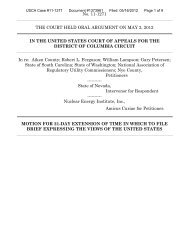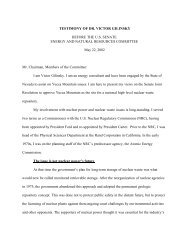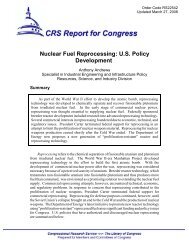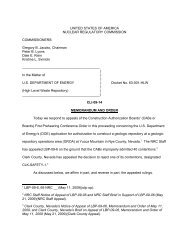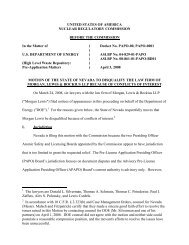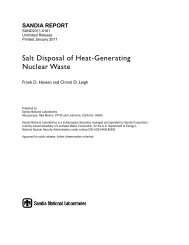The FuTure oF nuclear Fuel cycle - MIT Energy Initiative
The FuTure oF nuclear Fuel cycle - MIT Energy Initiative
The FuTure oF nuclear Fuel cycle - MIT Energy Initiative
You also want an ePaper? Increase the reach of your titles
YUMPU automatically turns print PDFs into web optimized ePapers that Google loves.
Chapter 9 — American Attitudes about<br />
Nuclear Power and Nuclear Waste 1<br />
Public attitudes toward <strong>nuclear</strong> power have shaped the federal and local policies concerning<br />
siting and construction of new <strong>nuclear</strong> plants and the development of interim and longterm<br />
waste storage facilities. <strong>The</strong> collapse of public support nationwide for <strong>nuclear</strong> power<br />
following Three Mile Island as well as local opposition to specific facilities is one factor<br />
contributing to the weak growth in this industry over the past 30 years.<br />
Since 2002, the <strong>MIT</strong> energy studies have gauged public understanding of and attitudes toward<br />
<strong>nuclear</strong> power and other energy sources. <strong>The</strong>se studies are random sample surveys of<br />
adults in the United States, conducted in 2002, 2003, 2006, 2007, and 2009, over the Internet<br />
by Knowledge Networks. <strong>The</strong> 2002 and 2007 surveys go into the greatest depth about <strong>nuclear</strong><br />
power and more extensive analyses of these surveys as well as data are available through<br />
the <strong>MIT</strong> CANES 2 and <strong>MIT</strong> Political Science Department 3 . <strong>The</strong> 2007 study replicates much<br />
of the 2002 survey, which is presented in the report <strong>The</strong> Future of Nuclear Power. <strong>The</strong> 2009<br />
survey contains a smaller battery of questions focused on waste disposal and to get the<br />
most current reading on attitudes toward construction of new <strong>nuclear</strong> plants. <strong>The</strong>se surveys<br />
replicate questions asked by earlier surveys, some dating as far back as 1973. This allows us<br />
to extend the time series of public opinion surveys on <strong>nuclear</strong> power, especially questions<br />
concerning waste, safety, and expansion of <strong>nuclear</strong> power. In addition, the surveys include<br />
new items in order to examine the bases for public support.<br />
Of particular interest is whether growing concern about global warming might lead to<br />
greater support for <strong>nuclear</strong> power. Addressing this question requires including measures<br />
of concern about global warming as well as support for <strong>nuclear</strong> power in the same survey<br />
as well as measures of other concerns that might explain the overall attitude an individual<br />
has toward <strong>nuclear</strong> power. <strong>The</strong>se other factors include cost of electricity production using<br />
<strong>nuclear</strong> power, possible local environmental risks, likelihood of an accident, and concerns<br />
about waste storage. This chapter focuses on what these surveys reveal about overall support<br />
for <strong>nuclear</strong> power and its connection to public concern about waste storage.<br />
Support For buildinG neW nuClear poWer plantS<br />
To begin with, some background. A series of public opinion surveys establish a clear trend<br />
of declining public support for building additional <strong>nuclear</strong> power plants from the mid 1970s<br />
through 2000. <strong>The</strong> surveys were conducted by various organizations 4 , especially Cambridge<br />
<strong>Energy</strong> Research Associates (CERA) and Gallup, asking the question “Do you support or<br />
oppose building new <strong>nuclear</strong> power plants?” 5 <strong>The</strong> trend shows a precipitous drop in sup-<br />
chapter 9: american attitudes about <strong>nuclear</strong> Power and <strong>nuclear</strong> Waste 127


